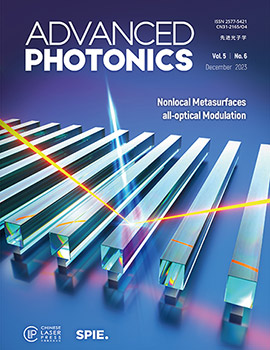Harnessing the magic of light: spatial coherence instructed swin transformer for universal holographic imaging
IF 18.8
1区 物理与天体物理
Q1 OPTICS
引用次数: 0
Abstract
Holographic imaging poses significant challenges when facing real-time disturbances introduced by dynamic environments. The existing deep-learning methods for holographic imaging often depend solely on the specific condition based on the given data distributions, thus hindering their generalization across multiple scenes. One critical problem is how to guarantee the alignment between any given downstream tasks and pretrained models. We analyze the physical mechanism of image degradation caused by turbulence and innovatively propose a swin transformer-based method, termed train-with-coherence-swin (TWC-Swin) transformer, which uses spatial coherence (SC) as an adaptable physical prior information to precisely align image restoration tasks in the arbitrary turbulent scene. The light-processing system (LPR) we designed enables manipulation of SC and simulation of any turbulence. Qualitative and quantitative evaluations demonstrate that the TWC-Swin method presents superiority over traditional convolution frameworks and realizes image restoration under various turbulences, which suggests its robustness, powerful generalization capabilities, and adaptability to unknown environments. Our research reveals the significance of physical prior information in the optical intersection and provides an effective solution for model-to-tasks alignment schemes, which will help to unlock the full potential of deep learning for all-weather optical imaging across terrestrial, marine, and aerial domains.利用光的魔力:用于通用全息成像的空间相干指示旋转变压器
当面对动态环境引入的实时干扰时,全息成像提出了重大挑战。现有的全息成像深度学习方法往往仅仅依赖于基于给定数据分布的特定条件,从而阻碍了它们在多场景中的泛化。一个关键的问题是如何保证任何给定的下游任务和预训练模型之间的一致性。本文分析了湍流引起图像退化的物理机制,并创新地提出了一种基于swin变压器的方法,即列车-相干-swin (TWC-Swin)变压器,该方法利用空间相干(SC)作为自适应的物理先验信息,在任意湍流场景中精确对齐图像恢复任务。我们设计的光处理系统(LPR)可以操纵SC和模拟任何湍流。定性和定量评价表明,TWC-Swin方法优于传统的卷积框架,能够实现各种湍流下的图像恢复,具有鲁棒性、强大的泛化能力和对未知环境的适应性。我们的研究揭示了物理先验信息在光学交叉中的重要性,并为模型-任务对齐方案提供了有效的解决方案,这将有助于释放深度学习在陆地、海洋和空中领域的全天候光学成像的全部潜力。
本文章由计算机程序翻译,如有差异,请以英文原文为准。
求助全文
约1分钟内获得全文
求助全文
来源期刊

Advanced Photonics
OPTICS-
CiteScore
22.70
自引率
1.20%
发文量
49
审稿时长
18 weeks
期刊介绍:
Advanced Photonics is a highly selective, open-access, international journal that publishes innovative research in all areas of optics and photonics, including fundamental and applied research. The journal publishes top-quality original papers, letters, and review articles, reflecting significant advances and breakthroughs in theoretical and experimental research and novel applications with considerable potential.
The journal seeks high-quality, high-impact articles across the entire spectrum of optics, photonics, and related fields with specific emphasis on the following acceptance criteria:
-New concepts in terms of fundamental research with great impact and significance
-State-of-the-art technologies in terms of novel methods for important applications
-Reviews of recent major advances and discoveries and state-of-the-art benchmarking.
The journal also publishes news and commentaries highlighting scientific and technological discoveries, breakthroughs, and achievements in optics, photonics, and related fields.
 求助内容:
求助内容: 应助结果提醒方式:
应助结果提醒方式:


